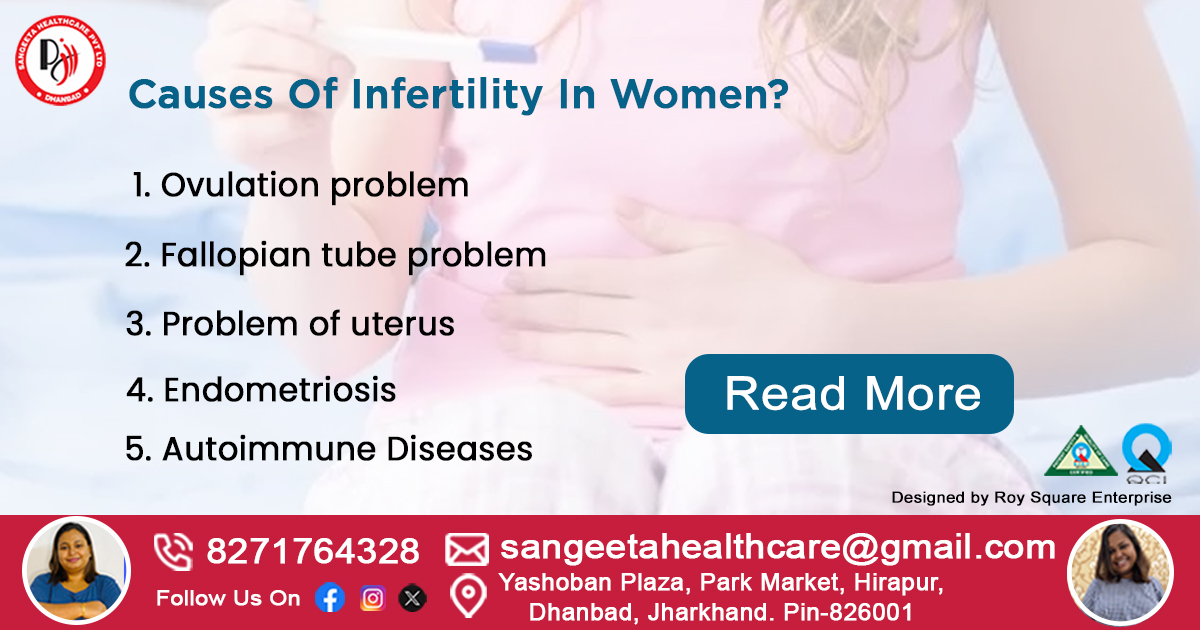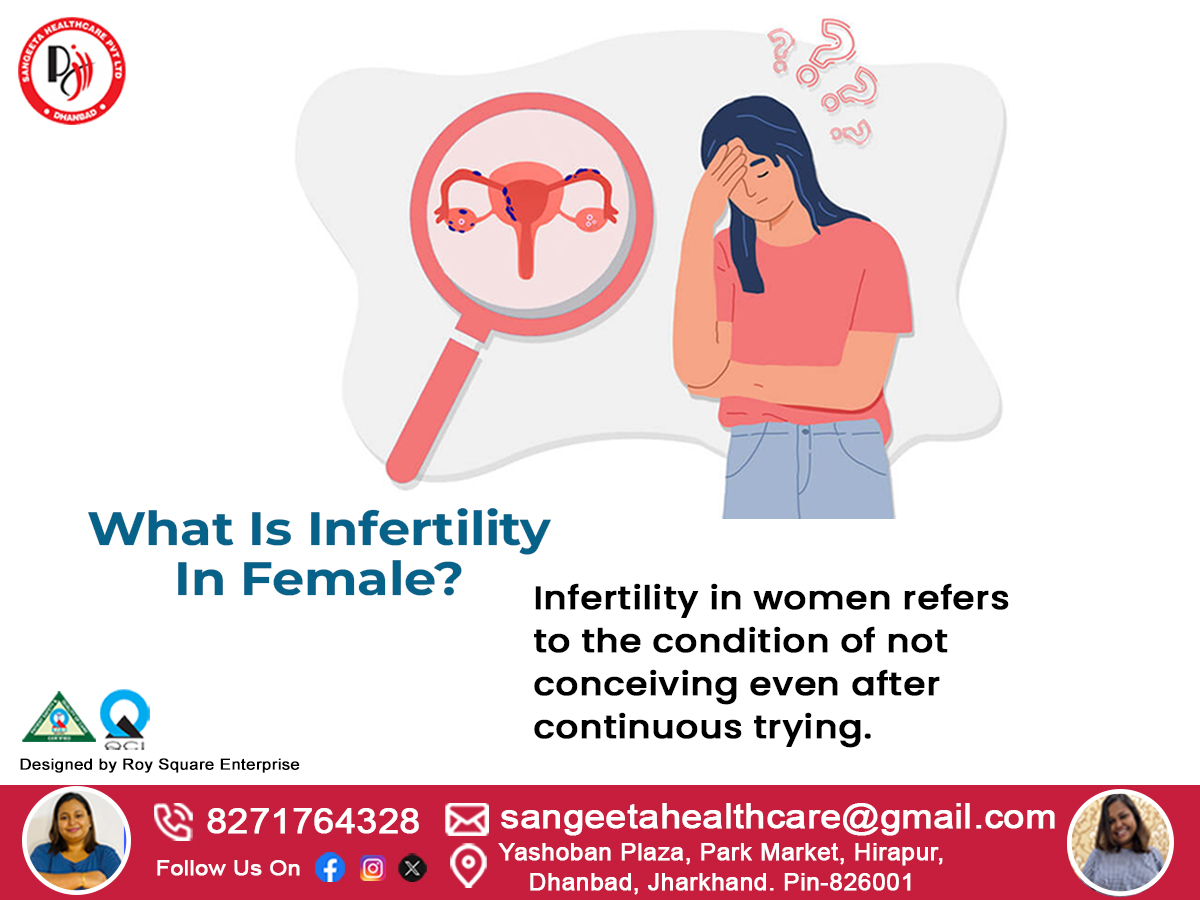Female infertility refers to a woman’s inability to conceive or you can say a failure to achieve a pregnancy, even after trying a lot. When the ovaries produce eggs and it’s got fertilized by sperm, a new life begins and you get pregnant. But if after trying for one year you are facing difficulties to conceive, there may be an infertility issue. Almost 48 million women are affected worldwide.
Symptoms of female infertility
You may diagnosed with infertility problems after 1 year of trying with unprotected sex. There may be only a few symptoms through which you can identify infertility. Those symptoms are
- Unable to conceive
- Irregular periods, like delay/early periods or missed period
- Light or heavy bleeding
- Miscarriage
What are the causes of infertility in women?
Causes related to infertility in women are mentioned below:-

1.Ovulation problem
Women who can not ovulate properly or have frequent ovulation may face trouble to conceive. Ovulation problem is related to many causes. Those causes are –
- Polycystic Ovary Syndrome: PCOS is a condition where your body releases more male hormone (androgen) than female hormones. This leads to suppression of the ovulation process due to lack of female hormones and it don’t allow mature eggs to release from ovaries. This is how the problem occurs. Without mature eggs pregnancy will not happen.
- Hypothalamus dysfunction: Hypothalamus is a part of our brain that is important for reproductive system. This gland produce GnRH hormone that regulates two essential hormones, Follicle-Stimulating Hormone (FSH) & Luteinizing Hormone (LH) and these are important for ovulation. Any imbalance or dysfunction in can disrupt hormone regulation, causing irregularities in ovulation and ultimately leading to infertility.
- Premature ovarian failure: Premature ovarian failure condition where ovaries stop working and menstrual periods also stop before you enter in your 40s. Early menopause destroys the egg quality and quantity. The reason can be genetic or autoimmune influence. So, it can also be a reason for infertility.
2.Fallopian tube problem
When a woman ovulates, her eggs travel from ovaries to fallopian tubes. This is the point where the fertilization process occurs. After the fertilization process the developed embryo (early development stage of humans or animals) travels to uterus for implantation and you become pregnant. If the fallopian tube is blocked or damaged, it will block the root of sperm reaching to egg in the fallopian tube and due to this conditions no fertilization will occur. This will lead to infertility. Infections like PID (Pelvic inflammatory disease), tuberculosis and past surgeries also can damage fallopian tube.
3.Problem of uterus
- Some people born with structural abnormalities of uterus. For this you may face difficulties in conceiving. Problem like Cervical Stenosis can happen. In this case the cervix become narrow, for which it may create problem for sperms to travel into uterus. This condition can lead to infertility.
- Some people may suffer due to fibroids and polyps. It can prevent the fertilized eggs from implantation.
4.Endometriosis
In the condition of endometriosis the tissue similar to the lining of uterus, grows outside the uterus or unusual places like in ovaries or fallopian tubes, which is risky, as it can block the fallopian tube or generate cysts in the ovaries. So, it can also lead to infertility.
5.Autoimmune Diseases
Autoimmune diseases like thyroid, diabetes can affect your ovaries. An autoimmune attack to your ovaries can damage your egg count or eggs quality and make it difficult to get pregnant. So, it’s leads to infertility.
6.Age
Age directly affect your fertility process. When you turned 30, the number of egg production and their quality started to decline.
7.Lifestyle factor
The way you live matters a lot in fertility. Unhealthy lifestyles like smoking, excess drinking, using tobacco, obesity, junk food intake, stress, poor diet and no exercise create complications for fertility.
Treatment of female infertility
Treatment of female infertility can be done through various ways like, medications, surgeries, assisted reproductive technologies and lifestyle changes.

Medications or fertility drugs
Fertility drugs are used to stimulate ovulation for women who can’t ovulate. It also helps to balance hormones. Medications include:
- Clomiphene Citrate: Your doctor may prescribe which will stimulate ovulation by causing the pituitary gland to release follicle-stimulating hormone (FSH) & Luteinizing hormone (LH). These are essential for an ovarian follicle containing an egg. These medications can be taken orally or through injection.
- Gonadotropins: Gonadotropins are used to treat female infertility related problems. These are injectable medications. These can stimulate ovulation and egg growth.
- Metformin: Metformin is a drug that helps to improve insulin resistance, a common problem in PCOS. It will help to increase the frequency of ovulation.
- Letrozole: It’s a oral pill that manages fertility. It is more effective than clomiphene with women who are suffering due to PCOS and obesity.
Assisted reproductive therapy (ART)
Assisted reproductive therapy refers to the group of medical treatments that are designed to help couples for conceive. With the help of laboratory and new technologies all of these are done.
- In-vitro fertilization(IVF): After an egg retrieval surgery with the help of modern technologies egg & sperm are fertilize in a lab. Then the embryo will transfer to the womb directly. This process also gives you a chance to store embryos for future. The success rate of IVF is high and it’s getting popular day by day.
- Intrauterine insemination (IUI): This involves inserting sperm through uterus directly during ovulation period. A tiny catheter is used to deliver the sperm directly into the uterus near the fallopian tube, so that, the chance of fertilization may increase.
- Gamete Intrafallopian Transfer (GIFT): In case of GIFT eggs and sperm are injected into fallopian tube to fertilize naturally. This happens with a surgical procedure. With GIFT fertilization occurs inside the woman’s body, not in outside. After the fertilization process the embryos make their way to uterus for implantation.
- Zygote Intrafallopian Transfer (ZIFT): ZIFT is also a ART procedure. Here the fertilization process happens in laboratory. The sperm & egg are fertilized outside and the embryo is placed in the fallopian tube.
- Egg donation or Surrogacy: Egg donation is a method of ART, where a women with healthy eggs donate their eggs to other women so that she can conceive. In case of surrogacy, another women carry the baby of another couple.
Surgeries
Here are three types of surgical procedures for female infertility
- Laparoscopic surgery: Laparoscopic surgery is a minimally invasive procedure. Here a laparoscope ( thin lighted tube with camera) is inserted into your reproductive organ to start the treatment process. Problems like ovarian cysts can be removed through this.
- Hysteroscopy surgery: Hysteroscopy allows a surgeon to look inside the uterus through a thin tube with camera. For this, they can easily understand the condition and can start the surgery. This surgery is useful to treat fibroids.
- Tubal surgery: This surgery helps to prevent infertility. This surgery to related to fallopian tube. Tubal surgery treats the blocked and damaged fallopian tubes so that they can act properly.
Lifestyle change
Maintaining a healthy weight, exercising daily, eating fresh fruits & vegetables, quiting smoking and drinking can bring a huge change into your body and will reduce the chance of struggling due to infertility.
FAQ: Frequently asked Questions
- What is infertility in female?
Answer: Infertility in women refers to the condition of not conceiving even after continuous trying.
- What are the causes of infertility?
Answer: Ovulation problem, Infection, Fallopian tube damage and many others can cause infertility.
- Does IVF really helps in infertility issue?
Answer: The success rate of IVF is high. People are trusting this process. And it’s a great option to overcome infertility.
- What is tubal surgery?
Answer: Tubal surgery is related to fallopian tube. This surgery can fix any damages or blockages of fallopian tube.
- How much common is infertility?
Answer: Infertility is very much common these days. Every 1 out of 5 female have this problem.



